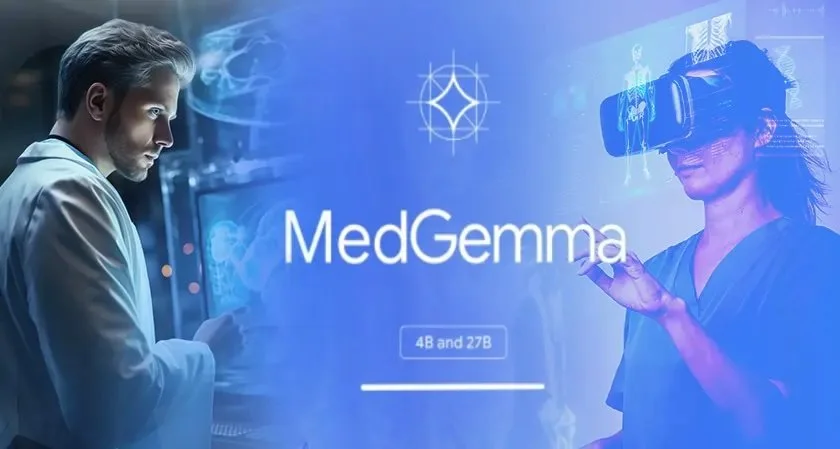AI News: Google Health Models
A New Era of Healthcare AI for Mental Health Providers
Healthcare AI is no longer a distant possibility—it's reshaping how medical care is delivered today. From diagnostic support to clinical documentation and patient communication tools, AI is becoming integral to healthcare workflows. Now, Google has released something that could significantly impact mental health practice: MedGemma, their most advanced open-source AI models designed specifically for healthcare applications.
For mental health providers, this represents both unprecedented opportunities and new challenges that require immediate attention.
What is MedGemma?
MedGemma is Google's collection of AI models specifically trained for healthcare tasks. Unlike general AI tools like ChatGPT, these models have been optimized with medical literature, clinical data, and healthcare-specific training to understand medical terminology, interpret clinical information, and generate medically-relevant content.
Key Components:
MedGemma 4B Multimodal: A lightweight model that can process both text and images, suitable for mobile devices
MedGemma 27B: A more powerful model for complex clinical tasks, scoring 87.7% on medical knowledge benchmarks
MedSigLIP: A specialized image encoder for medical imaging tasks like X-ray analysis
The models demonstrate impressive capabilities: 81% of chest X-ray reports generated by MedGemma 4B were judged by radiologists as clinically adequate, and the 27B model performs comparably to much larger, more expensive AI systems.
Real-World Applications Already Emerging
Healthcare organizations worldwide are already experimenting with MedGemma:
DeepHealth in Massachusetts is using MedSigLIP for chest X-ray analysis and nodule detection
Chang Gung Memorial Hospital in Taiwan found MedGemma effective with traditional Chinese medical literature
Tap Health in India noted the model's reliability for clinical tasks like summarizing progress notes and suggesting guideline-aligned recommendations
Google has even created a demo showing how MedGemma can streamline pre-visit information gathering for patient appointments—a direct application relevant to mental health practices.
The Open Source Advantage and Challenge
Unlike proprietary AI tools, MedGemma's open-source nature offers several advantages:
Privacy Control: Models can run on local hardware, keeping sensitive patient data in-house
Customization: Healthcare organizations can fine-tune models for specific applications
Stability: Unlike APIs that change over time, these models remain consistent
Cost Efficiency: The 27B model offers performance comparable to much more expensive alternatives
However, this open approach creates new challenges for mental health providers: most practices lack the technical infrastructure to implement and maintain these sophisticated AI systems independently.
What This Means for Mental Health Practice
Immediate Implications:
Documentation Support: MedGemma could revolutionize clinical note-taking and report generation
Treatment Planning: The models show promise for generating evidence-based treatment recommendations
Multilingual Care: Strong performance in non-English languages could help serve diverse patient populations
Training Applications: Could serve as sophisticated educational tools for mental health professionals
Practical Considerations: Mental health providers need to understand that while MedGemma offers powerful capabilities, it requires careful implementation:
Technical Expertise Required: These aren't plug-and-play tools—they need significant technical knowledge to implement safely
Integration Challenges: Most practices will need to work with technology vendors to access these capabilities
Quality Assurance: Providers must be able to verify AI-generated clinical content
Patient Consent: Clear communication about AI involvement in care will be essential
The Regulatory Landscape
Google's own disclaimer is revealing: MedGemma is "not intended to directly inform clinical diagnosis, patient management decisions, treatment recommendations, or any other direct clinical practice applications." Yet the entire value proposition centers on healthcare applications.
This reflects the broader regulatory uncertainty surrounding healthcare AI. As California develops its AI framework through SB 579 and AB 489, and other states follow suit, mental health providers using AI tools will need to navigate evolving compliance requirements.
Action Steps for Mental Health Providers
Even if you're not currently planning to use AI tools, the landscape is changing rapidly. Here's how to prepare:
1. Assess Your Current State
Audit any digital tools your practice currently uses that might incorporate AI
Evaluate your practice's technical capabilities and infrastructure
Consider your patient population's comfort level with AI-assisted care
2. Plan for Integration
Research technology vendors who might offer MedGemma-based solutions for mental health
Develop policies around AI use in clinical decision-making
Create clear communication strategies for discussing AI with patients
3. Stay Informed
Monitor developments in healthcare AI regulation
Follow best practices emerging from early adopters
Consider training opportunities to understand AI capabilities and limitations
4. Update Your Documentation
Review consent forms and privacy policies
Develop disclosure language for AI involvement in care
Establish protocols for AI-assisted documentation and treatment planning
The Future of AI in Mental Health
MedGemma represents a significant advancement in healthcare AI—models that understand medical context and can generate clinically relevant content. For mental health providers, this could mean more efficient documentation, better treatment planning support, and improved access to evidence-based care recommendations.
However, successful implementation will require careful attention to patient safety, regulatory compliance, and ethical considerations. The technology is advancing faster than regulatory frameworks can keep up, placing significant responsibility on individual providers and healthcare organizations.
The question isn't whether AI will transform mental health care—it's whether we'll adopt it thoughtfully and safely. MedGemma and similar tools offer tremendous potential, but realizing that potential will require mental health providers to engage actively with both the opportunities and the challenges these technologies present.
As this technology landscape evolves, staying informed and prepared will be essential for mental health providers who want to leverage AI's benefits while protecting their patients and practices.
Stay tuned—we’ll keep updating this blog as new AI regulations for therapy develop in California. To explore practical tools that can help you use AI responsibly in your practice, join our newsletter.



